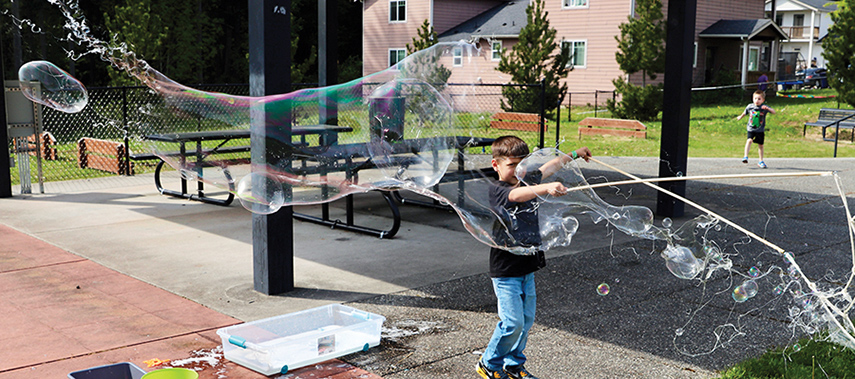
By Kalvin Valdillez, Tulalip News
“Bubbles!” exclaimed 7-year-old Zy’ani Johnson as countless bubbles caught in the wind and blew all about the Mission Highlands playground. While she watched a particularly big bubble fly away, young Marcus James chased it down. As it lifted high into the air, he reached it at the last second. Laughing with joy, he jumped into the sky with his index finger extended and popped it before it could get away. Returning to the bubble station, exuding jubilation and confidence from the adults cheering him on, Zy’ani welcomed him back and said, “Pop! Pop! Pop!”
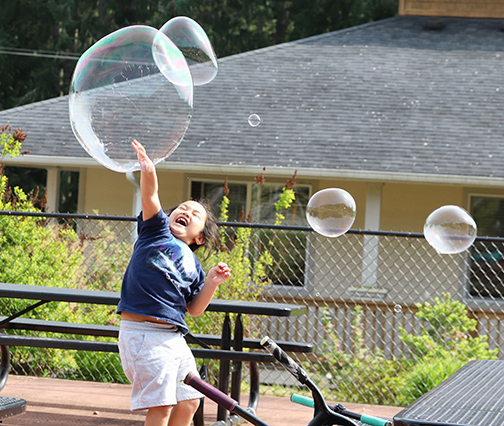
This bubble extravaganza, organized by Tulalip Family Haven’s Intellectual Developmental Disability Support program (IDD), took place on April 25 and was certainly heartwarming and one for the books. Held in celebration of Autism Acceptance Month, the springtime get-together brought smiles to dozens of local kids either diagnosed with an Autism Spectrum Disorder, or those who are in the process of receiving a diagnosis.
What made the event all the more special, was the fact that the bubble station was completely homemade, which allowed for some great interaction between the parents, kiddos, and the IDD team. Caseworkers, Alayna Helland and Talia Franza did their research and made numerous giant bubble wands simply from dowels and rope in anticipation of gathering.
When the families arrived, they got the chance to teach them how to use the bubble wands, making it a hands-on and sensory-satisfying occasion for the children. Evidenced by the happiness and gleeful expressions on their faces, the kids had a blast creating their own bubbles, which made for a much more memorable and fun experience than it would’ve if the IDD program decided to hire a bubble professional.
Still in its early years of infancy, the IDD program has done good work for Tribal families since its inception two years ago. Nationally, autism is becoming more prevalent in households across the country. According to the Centers for Disease Control and Prevention (CDC), one in thirty-six children in the United States are diagnosed with an ASD.
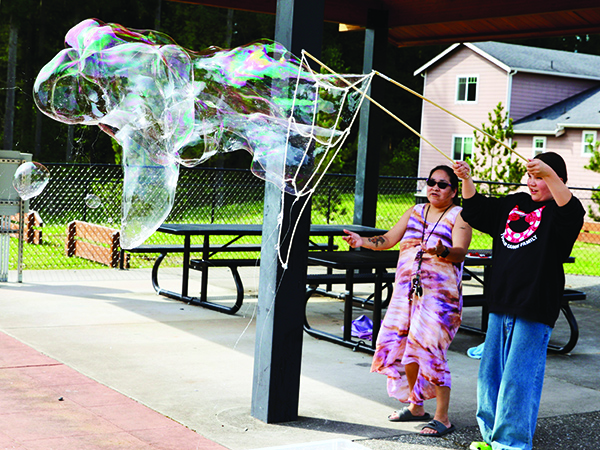
Though this statistic could be considered across the board for all races and nationalities, it could also be a little misleading when it comes to children living on reservations. This is due to a general lack of resources and information available to tribal families throughout the nation. While most kids living with ASD or IDD receive their diagnosis by the age of three, Indigenous youth often don’t get an official diagnosis until middle childhood or preadolescence.
This can be overwhelming for tribal families. Without receiving that diagnosis, which is a daunting process on its own, those families don’t have access to tools and resources that are helpful and fundamentally necessary during their kiddo’s early childhood years. The IDD program was established to help bridge that gap between the reservation and those resources.
The program is referral-based and takes both outside referrals, from other tribal programs and/or the Marysville School District, as well as self-referrals where a family can request services by either in-person appointments or by completing an online application on Family Haven’s tribal department webpage. They offer their services to Tulalip tribal members as well as to other Natives who live in Snohomish County. IDD services include monthly play groups, weekly support groups, community outreach, connecting families with resources, and assistance with any applications in regard to their child’s needs such as medical, disability, and caregiving.
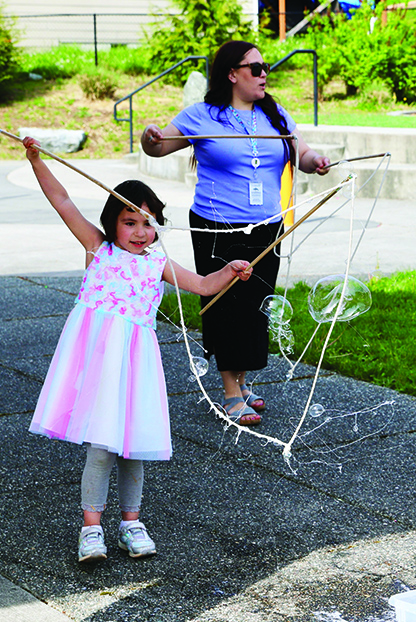
The Autism Acceptance Month bubble event encompassed all of these services in one. Inside the Mission Highlands building, there was a resource booth filled with all the necessary paperwork and informational flyers for the families to learn more about the program and how they can assist their kids throughout their journey. Most importantly, the gathering allowed families the chance to get to know each other, and also for the youngins to socialize together while engaging in bubble play. This has been proven to be impactful for kids with autism and their brain development and cognitive function because of its emphasis on patience, perception, creativity, sensory integration, visual tracking, hand-eye coordination, cause and effect, social interaction/skills, and motor skills.
While her son, Marcus, made his way back and forth from the playground to the bubble station, Yulia James shared, “I wanted for him to have fun and be around kids his age, make new friends. He is an only child, so I wanted him to get to know everybody and other people besides just his relatives. My son is not diagnosed with autism yet, we are still waiting on the diagnosis. But Alayna has helped me with everything and helped us go through all the channels. This is good to see – that he likes to have fun with different kids. I would love for more events like these to happen more often.”
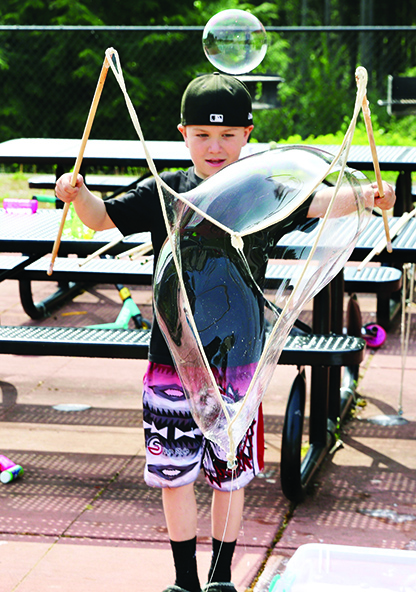
As his daughters Zy’ani and Anirrah, were fully immersed in that bubble life, Quincy Johnson expressed, “Both of my daughters have autism, so we were looking for programs to help us out. This is still fairly new to me, Zy’ani is seven and was diagnosed two years ago and I’m still getting my youngest diagnosed. I’m still learning and figuring stuff out as I go. I can honestly say Family Haven is a blessing. They helped with resources and support because I didn’t know where to start. And today – I just love it. I feel like there needs to be more events like this for kids with autism. I didn’t know how they were going to act around other kids, but they’re doing fine. They love bubbles. They’re loving it, so I’m loving it too. What Family Haven is doing is wonderful and I’m so thankful for them.”
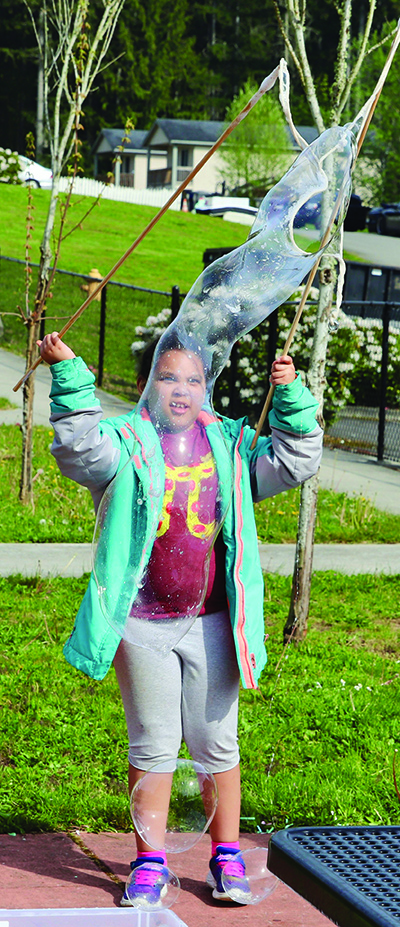
The two-hour bubble bash was a success and has many families looking forward to more group play and events.
Said Alayna, “Today felt really good. The kids really took to the bubbles and the adults too. We had a lot of sensory stuff going on, the bubble play, and sidewalk chalk, and just being outside. We always try to have a sensory-based activity to keep the kids busy and interested and it seemed to really work out today. A lot of our parents feel secluded at home because kids who are autistic, they have their quirks and their ticks and there are different things about them. I feel that when we have events like this, they can be accepted for who they are. And it feels good to provide a space where they can be themselves, have fun, and be happy.”
For more details about the IDD program, please contact (360) 716-4935.